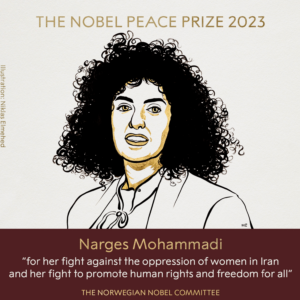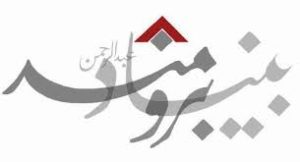“Zan – Zendegi – Azadi” – “Woman – Life – Freedom.” That was the message prefacing the Norwegian Nobel Committee’s announcement that it was awarding the Nobel Peace Prize for 2023 to Iranian rights advocate Narges Mohammadi “for her fight against the oppression of women in Iran and her fight to promote human rights and freedom for all.”
“Her brave struggle has come with tremendous personal costs. Altogether, the regime has arrested her 13 times, convicted her five times, and sentenced her to a total of 31 years in prison and 154 lashes,” the Committee added.
“I will never stop striving for the realization of democracy, freedom and equality,” she said in a statement released through The New York Times after the Nobel announcement.
 Mohammadi’s husband, Taghi Rahmani, told RFE/RL’s Radio Farda that the Nobel announcement “opens a window for the fight for democracy, for human rights, civil equality and it also makes Narges’s responsibility heavy and as she’s said, ‘Any prize makes me stronger for the human rights goals that I have.'”
Mohammadi’s husband, Taghi Rahmani, told RFE/RL’s Radio Farda that the Nobel announcement “opens a window for the fight for democracy, for human rights, civil equality and it also makes Narges’s responsibility heavy and as she’s said, ‘Any prize makes me stronger for the human rights goals that I have.'”
“I think this is important, it’s not just a prize for Narges, it brings attention to the resistance that is ongoing in Iran for freedom, democracy, and civil equality,” he added.
“Her 30 years of activism to peacefully bring grass-roots change to Iran through education, advocacy and civil disobedience and to strengthen civil society has come with a hefty price: her liberty, her health and separation from her husband, children and parents,” writes for The New York Times.
The regime’s charges against the prominent human rights defender and prisoner of conscience include “spreading propaganda against the system” and “gathering and colluding to commit crimes against national security”, all of which stem from her peaceful human rights activism, says the Abdorrahman Boroumand Center for Human Rights in Iran.
“Protest movements are capable of giving power to civil society and the public arena, through which democracy is achieved,” Mohammadi told Reporters Sans Frontieres back in 2022.
“What is my message? Listen to the will of the Iranian people seeking a transition away from the authoritarian system, and the restoration of democracy and human rights,” she added.
Her two children read the letter she sent to RSF from her cell in Evin prison, near Tehran, where she has been held since 16 November 2021, as she was awarded the RSF Prize for Courage.
 “This award is a slap in the face of Ali Khamenei’s regime which has declared war on its own people,” her fellow rights activist Masih Alinejad tweeted, adding that 16-year old Armita Geravand remains in a coma after being beaten up by morality police for not wearing a hijab.
“This award is a slap in the face of Ali Khamenei’s regime which has declared war on its own people,” her fellow rights activist Masih Alinejad tweeted, adding that 16-year old Armita Geravand remains in a coma after being beaten up by morality police for not wearing a hijab.
“Narges is a hero of humanity, whose commitment to freedom for the women of Iran represents the very best of the Iranian people in the face of a brutal regime,” said Canadian human rights lawyer Irwin Cotler, founder of the Raoul Wallenberg Center for Human Rights.
“Protest movements are capable of giving power to civil society and the public arena, through which democracy is achieved,” @NobelPrize laureate #NargesMohammadi told @RSF_inter @RSF_en https://t.co/21XNhUm9mU
— Democracy Digest (@demdigest) October 6, 2023
To understand more fully how the Islamic Republic has endured for more than four decades requires us to compare the dynamics of authoritarian stability with those facing challengers or revolutionaries, argues Misagh Parsa, professor of sociology at Dartmouth College and author of Democracy in Iran: Why It Failed and How It Might Succeed:. Here, authoritarians have a structural edge, he wrote for the NED’s Journal of Democracy.
⚡️ BREAKING: The 2023 Nobel Peace Prize goes to Narges Mohammadi. A timely message of solidarity with the people of Iran. As a 16-year-old girl lies in a coma after being assaulted by the hijab police, we must stand with Iranians struggling under the jackboot of a brutal regime. pic.twitter.com/po8mC7pkLY
— Hillel Neuer (@HillelNeuer) October 6, 2023







